Table of Contents
We’ve heard the question from potential clients, existing clients, and even SEO professionals themselves: how long does it really take to see results from SEO?
We're going to dive into detail to help you forecast your SEO growth, but let's start with a few truths that apply to nearly all situations:
- It usually takes between 3 and 6 months to start seeing measurable changes from SEO
- Achieving long-lasting success from integrating SEO takes significantly longer
- There are a number of factors that influence how long it takes for SEO to work
It goes without saying that the answer depends, so we’ll save you the trouble of pounding your head against the wall and cut to the chase: seeing noticeable results from SEO usually takes at least a few months of focused work, with the typical range being anywhere from 3 to 12 months to start seeing meaningful results.
From there, it will usually take many more months to achieve what we’d consider lasting success for most SEO clients: reliably high levels of relevant organic traffic that converts or otherwise directly contributes to business goals.
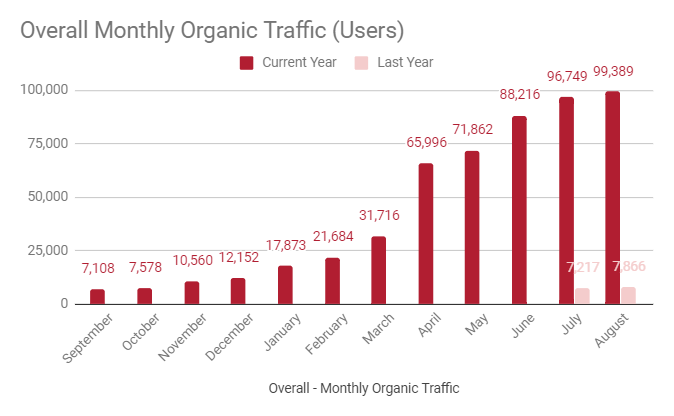
Let's go further to understand why SEO takes so long and how you can forecast growth.
Forecasting SEO Growth
SEO can be a tricky channel to forecast. Many internal and external factors influence performance (which we cover later in this article), some of which are difficult to predict.
So, we're going to share the results that we've been typically able to achieve in our experience working with our clients. A word of caution: These results are a reflection of how Uproer does SEO and the types of clients who most often hire us. You may not experience similar performance. At the end of this section, we've linked to a few forecasting models you can try out that may be a better fit for your unique situation.
Small Websites
Starting at <5k monthly non-brand organic traffic
When working with a website that has low levels of non-brand traffic at the onset, the opportunity to rank for new keywords is wide open. For this reason, a well-planned content strategy can yield strong relative SEO traffic growth rather quickly.
You might encounter challenges if the website is fairly new and/or has minimal link authority. These factors can cause SEO performance to improve more slowly than expected.
Our typical SEO performance for small websites
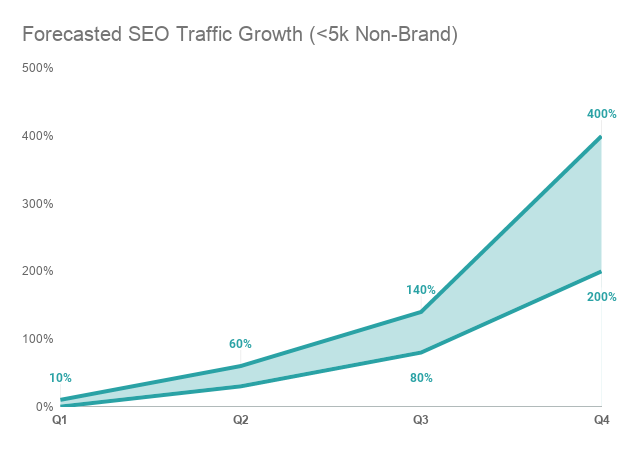
Medium Websites
Starting at 5k-20k monthly non-brand organic traffic
In this range, there's likely been some focus on SEO in the past or perhaps there's even an existing SEO strategy. While there's plenty of opportunities to rank for new keywords, you'll find tons of "striking-distance" keywords. By that we mean there are opportunities to optimize existing content and technical best practices to improve the rankings of keywords into higher, traffic-driving positions.
Often, the biggest challenge with these websites is prioritizing what to do first. Estimate the expected level of effort and potential impact of each opportunity so that you tackle the best opportunities on the front-end of your strategy.
Our typical SEO performance for medium websites
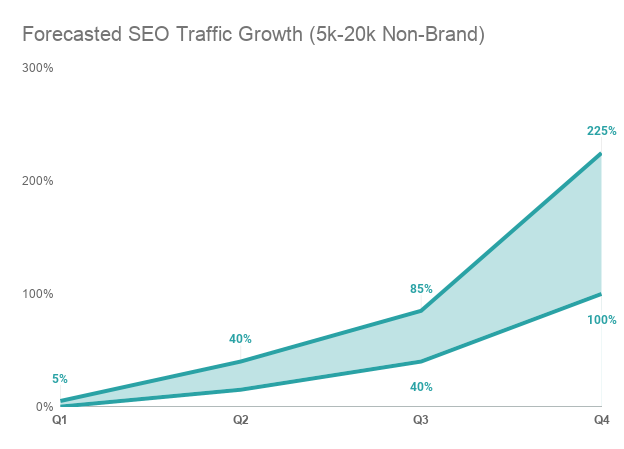
Large Websites
Starting at >20k monthly non-brand organic traffic
A website with established SEO performance might not have the same massive opportunities for relative traffic growth as one that's further behind. Rather, the priority here might be more around capturing incremental market share with surgical optimizations.
Furthermore, these clients are more concerned with increasing conversions from existing traffic rather than stressing the need for new traffic. Moving the needle on highly-competitive, conversion-driving keywords can be difficult and take considerable time. But small gains in rankings can mean big boosts to business.
Our typical SEO performance for large websites
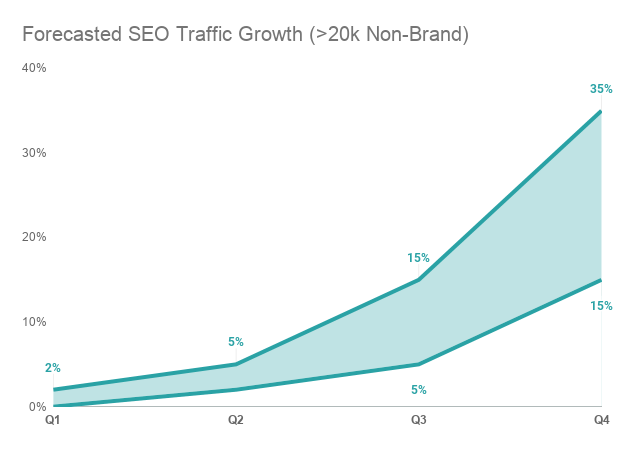
Forecasting Models for SEO
Check out these excellent resources on forecasting SEO growth:
- Forecasting SEO by Erudite
- SEO Forecasting in Google Sheets by Moz
- The ROI of SEO by Kevin Indig
Why Does SEO Take So Long?
SEO takes a while to start producing results for a number of reasons. For one, the work needed to successfully do SEO is in itself time-intensive, especially in the early stages. Keyword research, planning and writing content, traffic and ranking analysis - these are all regularly-occurring SEO projects that can eat up a lot of time.
Another reason is that SEO improvements are almost always incremental. SEO fits well with what Cycling coach Dave Brailsford calls the “aggregation of marginal gains.” Barring events such as algorithm updates, the improvements we see with SEO commonly look like this:
- A new blog post nets 300 more organic users/month
- Re-tooling a page title improves rankings slightly, capturing 150 more organic users/month
- Updating meta descriptions for a set of pages increases CTR, netting an additional 200 organic users/month
- And so on.
Finally, these incremental improvements themselves are often slow to take hold. For example, that new blog post first needs to be indexed by Google and ranked against other, similar posts. If for whatever reason it’s initially deemed to be a worse candidate than its competitors, it could be a long time before it ranks, if ever.
This stands in contrast to channels like paid search, which can be activated and deactivated much more quickly. While it takes time to test and fully optimize paid media campaigns, something will start happening almost immediately. Likewise, when paid media campaigns are paused or scrapped altogether, the spigot of continuous traffic is turned off almost instantly.
Factors that Influence How Long it Takes to Succeed Using SEO
If you’re one of the folks who’s actually interested in why it depends, the rest of this article is for you. Let’s start by taking a look at some factors that often affect how long it takes for SEO to work.
Industry Competition
To the surprise of probably no one, the more crowded and competitive an industry is, the more difficult it will generally be to see SEO gains. With plenty of exceptions, this difficulty often means success will take longer - either you’ll need to dedicate more hours in the same amount of time or your overall timeline will be longer. And that brings us to our next factor:
Internal Resources
How much time and energy can you allocate to SEO? Do you have a dedicated team that can partner with an agency to execute SEO at a fast and consistent pace? You’ll likely see relatively fast results. Is SEO more of an afterthought? Expect progress to be slower.
Existing Optimizations
If all SEO engagements began on an even playing field, we’d have a much smaller and more consistent range of time in which we’d expect to first see SEO results. In reality, that’s far from being the case. When we’re doing our initial audit, here are some of the things we look at in determining what our SEO roadmap will look like:
- Past SEO investment: has the business made a concerted effort to improve SEO in the past? If so and it’s been well-executed, this will create more initial momentum and reduce the amount of work needed to get SEO off the ground.
- Technical Infrastructure: are the website and CMS technically sound? Is the site relatively free from crawling and indexing issues, broken links, and other technical pitfalls? This will limit the time needed at the front end to fix these issues before moving on to on-page and content initiatives.
- Domain history and authority: is the domain established and does it have a good amount of authoritative and relevant backlinks? If so, this will make it easier to start ranking faster, since backlinks are important for SEO.
- Content: If there’s abundant, high-quality content already on the site, you're starting with a major advantage.
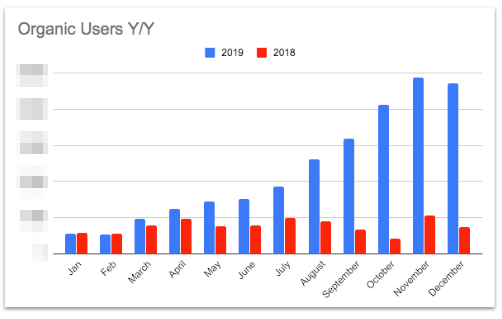
Another client whose traffic began to improve dramatically around month 7-8
The Importance of Defining SEO Success
It’s worth mentioning at this point that in order to best answer the question of how long it takes SEO to “work” for any given business, we’d need to know their goals and how those goals intersect with the factors mentioned above.
Here are a couple of examples to illustrate the point:
Example 1: Established brand with good existing content in a low-competition industry that’s looking to increase organic traffic by 10%. In this case, SEO should start showing signs of getting them to their goal within the first several months.
Example 2: Brand new affiliate website with no authority looking to get to 500K+ monthly organic users. This can and has been done countless times, but it’s going to take a lot of Red Bull and hours behind the keyboard to get there. A new site like this may take well over a year to generate any kind of significant revenue.
Why SEO is Worth the Wait
I find it helpful to think of SEO as being like a freight train: it takes a while to get going but when it does, the massive amount of momentum it has gathered makes its forward movement extremely efficient. SEO is similar; there’s usually a lot of hard work to be done in the beginning months across several different subdisciplines of SEO. But, once those initial projects have been completed and processes are firmly in place, SEO begins to work like a well-oiled machine, often leading to exponential growth given enough time.
When it comes to digital marketing channels, SEO is the ultimate form of delayed gratification. When getting started, it can feel like an impossibly long journey lies ahead. If you’re not careful, frustration and impatience can quickly creep in. But for those who are willing to invest the time and effort it takes to execute a well-designed SEO strategy over time, the rewards that come in the form of traffic and conversions are well worth it.

